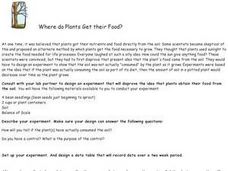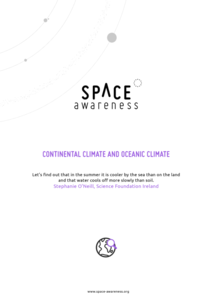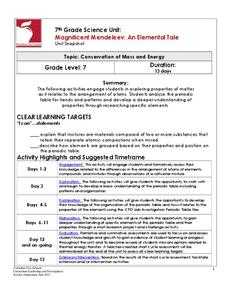Curated OER
The Inner Planets are Out of this World!
Students engage in an interactive instructional activity exploring the Inner Planets through PowerPoint instruction. They then continue their learning experience by participating in a web link activity.
Curated OER
Decision Making - A Mock Town Meeting on a Proposed Tank Farm
High schoolers engage in a instructional activity that is concerned with the establishment of a tank farm. They focus upon the issue in class discussion in the form of a mock town meeting. Students come up with possible solutions to its...
Curated OER
Health In Progress/ Soft Drinks
Students engage in a lesson that is concerned with the consumption of soft drinks by children. They examine the statistics about the consumption and determine the increase or decrease in individual servings consumed over time. They...
Curated OER
Ecology Worksheet
In this environment worksheet, students engage in the completion of 32 sentences to find the word that is used to complete the thoughts.
Curated OER
Is It Alive?
Students engage in an activity that demonstrates whether something is alive or not. In this physiology lesson plan students divide into groups and sort cards into categories.
Curated OER
Competition/Cooperation Relationships
Students view the PowerPoint slide of a lynx and hare and discuss what would happen if all the lynxes were destroyed. They then take notes on the lesson and brainstorm about other competitive/cooperative relationships as well as discuss...
Curated OER
Plants Scavenger Hunt Activity
The hunt is on! Provide young botanists with a list of eighteen plant-related questions and let them loose as they search for answers on corresponding fact cards. Perform this activity in the classroom or use it as an opportunity to take...
Columbus City Schools
Making Waves
Learning about waves can have its ups and downs, but a demo-packed tool kit has the class "standing" for more! Learners gain experience with several different wave types, organizing observations and data, and wave...
Columbus City Schools
Let’s Get Theoretical About Cells
Get up close and personal with cells in a hands-on journey to discover what makes up living things. Scholars learn valuable microscope skills, delve into the Modern Cell Theory, and gain insight into how cells reproduce. The included lab...
Curated OER
Where Do Plants Get Their Food?
Plants need food to survive, just like any other living organism. Young biologists analyze an experiment performed in 1610 by Jan van Helmont to determine if plant nutrition is obtained through the soil. First, lab groups work together...
Columbus City Schools
Photosynthesis and Respiration
Thirty percent of the world's oxygen is produced by rainforests found throughout the world. Seventh grade learners explore the processes of photosynthesis and respiration through 10 days of labs, manipulatives, and discussions. They...
Science Matters
Energy and Winds
In the study of wind energy, scholars build a small windmill and observe how it transfers wind into mechanical energy. Learners will make connections to the previous lesson plan with concepts such as the creation of wind...
Columbus City Schools
Biome Basics with a Disastrous Twist
Bored with your current biome bag of tricks? This bundle is a bountiful bag of biome fun! Travel the globe with seventh graders and explore the biotic and abiotic factors that define our world's biomes. Then, introduce a little...
Columbus City Schools
Earthly Waves
How did scientists discover what lies beneath the earth's surface? Dig a hole? X-ray vision? Guide your class through the types of seismic waves and how these waves helped shed light on Earth's many layers. The included resources provide...
Cornell University
Beam Focusing Using Lenses
Explore optics using an inquiry-based experimental approach! Young scholars use a set of materials to design and build a unit capable of focusing a beam of light. They experiment with different lenses to determine the best approach to...
National Wildlife Federation
An Energy Mix: Renewable and Nonrenewable Resources
What did the windmill say about renewable energy? I'm a BIG fan! Lesson three in the series of 12 has classes discuss potential and kinetic energy and then, in pairs, they complete a web quest over the different types of energy...
Science Matters
Lotusland
It's time for a field trip! Scholars take their new-found knowledge of adaptations and seed dispersal on a field trip to a local botanical garden. They gain an up-close look at how ecological interdependence works in a distinct...
Space Awareness
Continental Climate and Oceanic Climate
There's nothing better than a cool breeze blowing in from the ocean. Scholars explore how water affects change in temperature using a hands-on experiment on climate. They use measurement tools to compare the continental and oceanic...
Forest Foundation
Exploring Heat & Energy
How does fire keep itself going? Explore the ways that heat uses fuel and energy with a lesson plan about the fire triangle and combustion. Several activities demonstrate how heat moves from warmer objects to cooler objects, as well as...
Columbus City Schools
It’s Electric!
Shocking! Who knew so many great ideas existed for teaching middle schoolers about electricity? Find them all within this energetic framework. You'll light up at the variety of printable and web-based resources within! After building...
Columbus City Schools
Magnificent Mendeleev: An Elemental Tale
Discover how the periodic table tells the story of its elements. Learners begin by studying the makeup of several mixtures. Their analysis leads to a discussion of elements and the periodic table. As they dig deeper, they understand the...
Cornell University
Nano What?
The size of a nanoparticle is difficult for pupils to grasp. A hands-on experiment is designed to give your classes perspective. Learners analyze different sports drinks for the content of electrolytes as an introduction to nanoscale....
Curated OER
Form and Observation
Use a familiar song and adorable baby animal pictures to teach youngsters about genetic variation. Begin by listening to "Twelve Variations on 'Ah vous dirai-je Maman,'" which you will need to find online (there are several versions...
NASA
Melting Ice: Designing an Experiment
Sometimes, despite the best laid plans, the unexpected will occur. Learners witness this firsthand as they carefully design an experiment to determine the time needed for ice to melt in salt water or pure water. They uncover facts not...

























